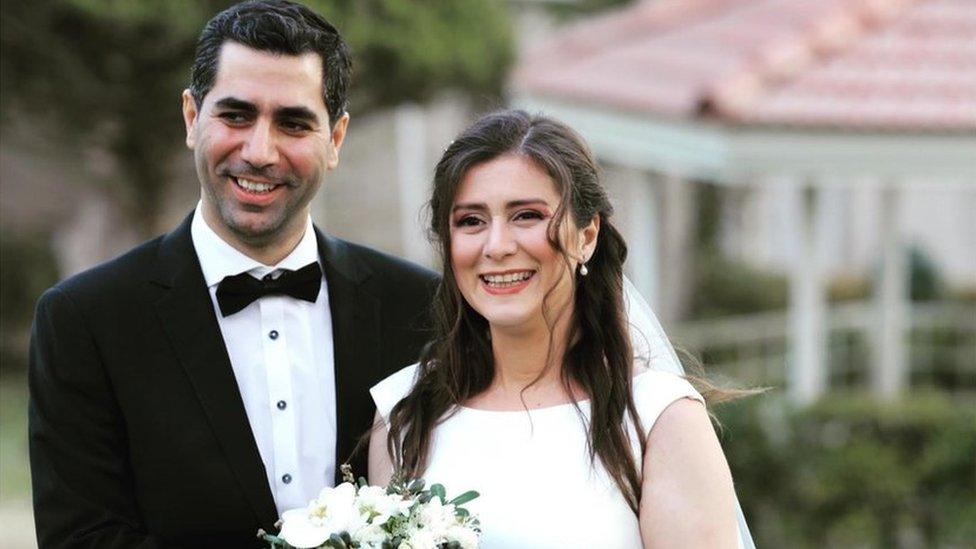Iran plane downing: Police deny shooting anti-government protesters
- Published
Anti-government protesters shout 'Death to the dictator' near Tehran's Azadi Square
Police in the Iranian capital, Tehran, have denied using live ammunition against protesters outraged by the shooting down of a Ukrainian airliner.
Officers had been given orders to "show restraint", the chief of police said.
Videos posted online on Sunday recorded what appeared to be gunfire and showed an injured woman being carried away.
Protests erupted on Saturday, after Iran admitted firing missiles by mistake at the Ukraine International Airlines jet that crashed near Tehran.
All 176 people on board flight PS752, mostly Iranians and Canadians, were killed.
Pedram Mousavi, Mojgan Daneshmand, and their two daughters were all passengers on flight PS752
For the first three days after the crash, Iran denied that its armed forces had shot down the plane and suggested there had been a technical failure.
The admission of responsibility, which came after video emerged of a missile appearing to hit the plane, provoked widespread anger in Iran against the establishment.
Days earlier, Iranians had been united in grief over the killing of Gen Qasem Soleimani, their country's second most powerful man, in a US drone strike in Iraq.
The latest reports of a possible crackdown echo the protests in Iran in November over rising fuel prices. Human rights groups say hundreds of people were killed.
What happened at the weekend protests?
Sunday's demonstrations went on late into the night, as people vented their fury against the Iranian government and the powerful Revolutionary Guards, who shot down the Ukrainian plane.
A video posted to social media shows a protester kicking and then ripping down a large poster of Soleimani.
Allow X content?
This article contains content provided by X. We ask for your permission before anything is loaded, as they may be using cookies and other technologies. You may want to read X’s cookie policy, external and privacy policy, external before accepting. To view this content choose ‘accept and continue’.

There were reports that a number of people were injured when security forces broke up a protest in Tehran's Azadi Square, external, during which people chanted "death to the dictator" - a reference to Supreme Leader Ayatollah Ali Khamenei.
One video posted on social media allegedly showed members of the paramilitary Basij Resistance Force, which is often used to suppress domestic dissent, attacking protesters in the area. What appears to be gunfire can be heard.
Allow X content?
This article contains content provided by X. We ask for your permission before anything is loaded, as they may be using cookies and other technologies. You may want to read X’s cookie policy, external and privacy policy, external before accepting. To view this content choose ‘accept and continue’.

Another video shows an injured woman being carried away, external by people who shout that she has been shot in the leg. A pool of blood, external is seen on the ground.
A protester who saw the injured woman told the BBC: "They started to come with sticks, they started to beat us. When we started to shout slogans, they started to bombard us with fire, they started to shoot."
Despite such reports, Tehran police chief Brig-Gen Hossein Rahimi insisted that his officers did not fire live ammunition at protesters.
"The police treated the people who had gathered with patience and tolerance," he said, before warning that "those who intend to manipulate the situation" would face consequences.
Iranian government spokesman Ali Rabiei meanwhile dismissed as "crocodile tears" US President Donald Trump's expressions of support for the protesters.
Allow X content?
This article contains content provided by X. We ask for your permission before anything is loaded, as they may be using cookies and other technologies. You may want to read X’s cookie policy, external and privacy policy, external before accepting. To view this content choose ‘accept and continue’.

Fresh protests reportedly took place on Monday afternoon outside universities in Tehran and the city of Isfahan.
Footage showed students at the capital's Sharif University of Technology chanting "They killed our elites and replaced them with clerics", external - a reference to Iranian students who were on flight PS752.
Prominent Iranians also added their voices to the protests.
The captain of the national men's volleyball team, Said Marouf, wrote on Instagram that he hoped Iran had seen its "last show" of "deceit and stupidity".
And one of Iran's most famous actresses, Taraneh Alidoosti, posted that Iranians were being treated not as citizens but as "hostages".
What's the latest on flight PS752?
Ukraine's Foreign Minister, Vadym Prystaiko, told the BBC that Iranian President Hassan Rouhani had assured the Ukrainian government in a telephone call that "no-one who is to [blame] will escape punishment".
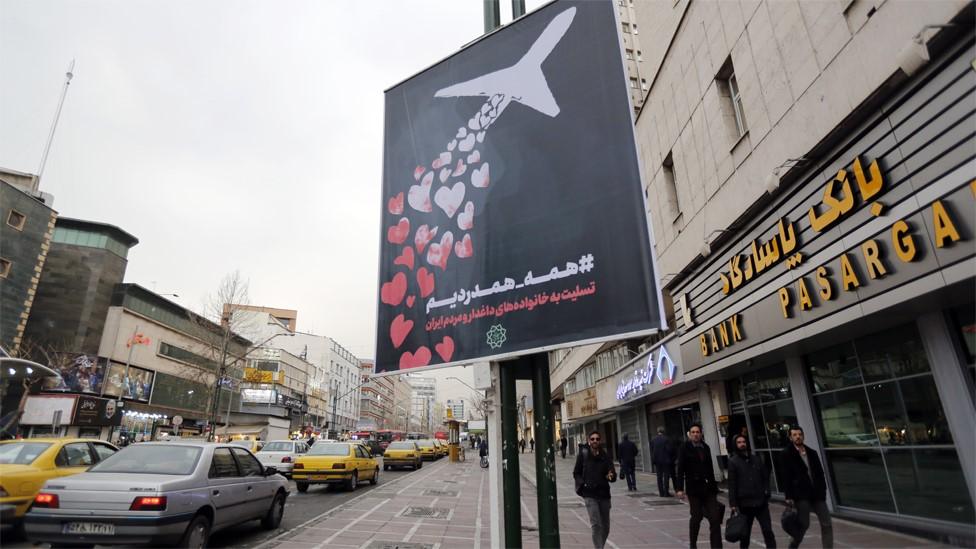
A banner on a lamppost in Tehran says: "We are all in pain and sympathise."
Mr Prystaiko added that five of the countries that had citizens on board the airliner - Canada, Ukraine, Afghanistan, Sweden and an unnamed country - would meet in London on Thursday to discuss possible legal action.
He said the "grieving nations" would work out what steps to take individually and collectively to "bring the perpetrators to justice and how we can repay those families who have suffered".
Canadian Prime Minister Justin Trudeau also told a memorial service for the 57 Canadian victims that their country would "not rest until we get the accountability, justice, and closure that the families deserve".
Later the head of Canada's Transportation Safety Board (TSB), Kathy Fox, said Iran still had the black boxes from the aircraft, and that they were damaged.
But Ms Fox said there were early signs that Iran was "allowing the TSB to play a more active role than normally permitted" - such as by inviting its investigators to take part in downloading and analysing data.
"We need full clarity on how such a horrific tragedy could have occurred"
The Iranian government meanwhile denied there had been a cover-up.
"On these sad days, numerous criticisms were raised against the country's officials; some of us have been accused of lying and secrecy. But honestly it was not like that," spokesman Ali Rabiei told reporters on Monday.
"The reality is that we did not lie," he added, blaming "a lack of valid information" and also "the US's psychological warfare" for his own and other officials' denials that the plane was shot down.
Mr Rabiei insisted that senior officials, including President Rouhani, did not know that missiles had been launched at the airliner until Friday evening.
However, the Revolutionary Guards' Aerospace Force Commander, Brig-Gen Amir Ali Hajizadeh, had said when admitting its role in the "unintentional" strike that he had informed officials about it on Wednesday.
Gen Hajizadeh said on Saturday that Iran's air defences had been on the highest state of alert because the Revolutionary Guards had just fired ballistic missiles at US bases in Iraq in retaliation for the killing of Soleimani.
Footage shows missile strike on Ukrainian plane in Iran
The operator of a missile defence system near Tehran's airport mistook flight PS752 for a US missile and due to problems with a communication system was unable to contact the command centre, according to the general.
"He had 10 seconds to decide," he added. "He could have decided to strike or not to strike, and under such circumstances he took the wrong decision."
In a separate development on Monday, the UK Foreign Office summoned Iran's ambassador in London following the detention of his British counterpart in Tehran after he attended a vigil for victims of the Ukrainian plane crash.
The CEO of Canadian company Maple Leaf Foods, Michael McCain, meanwhile criticised the US government, external for escalating tensions in the Middle East in the days before the crash, in which he said a colleague lost his family.
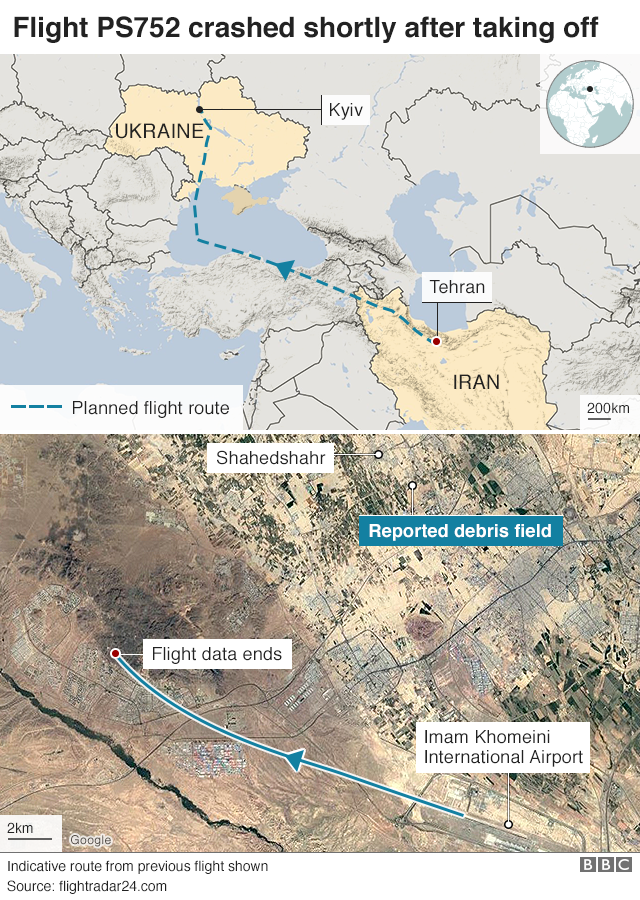

- Published13 January 2020
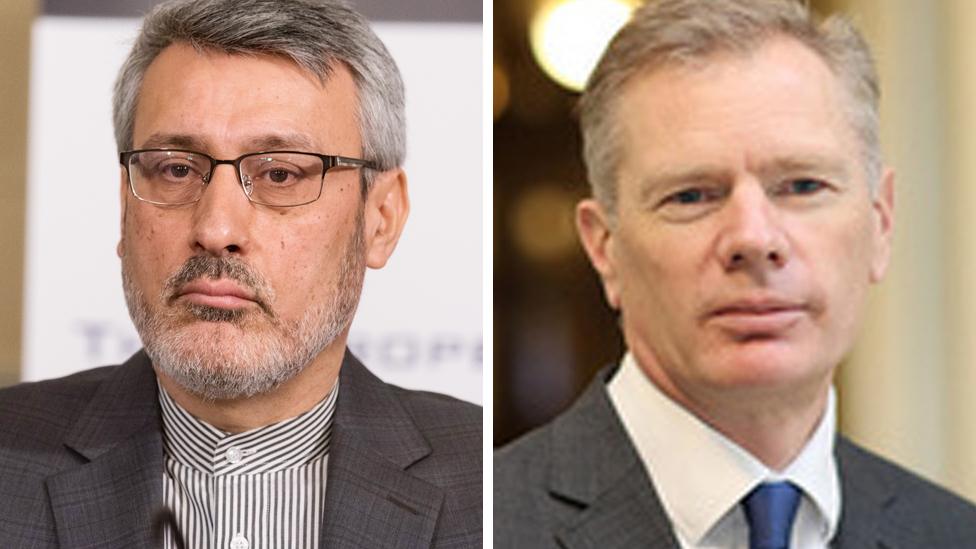
- Published13 January 2020
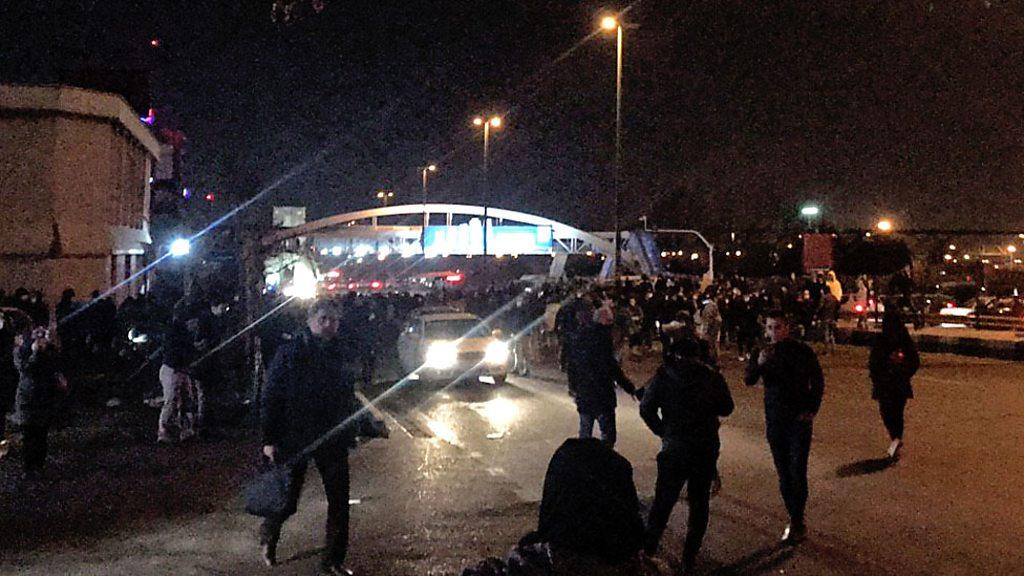
- Published12 January 2020
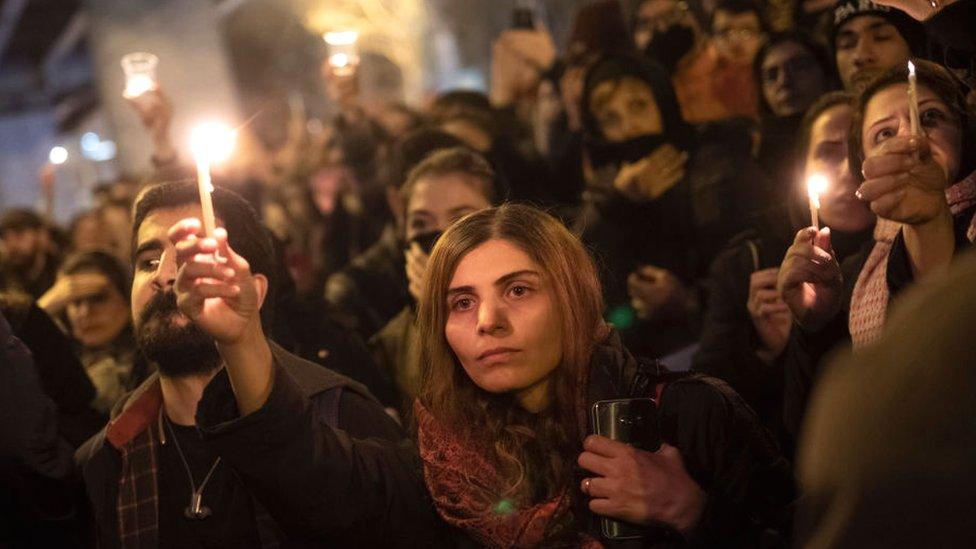
- Published14 January 2020
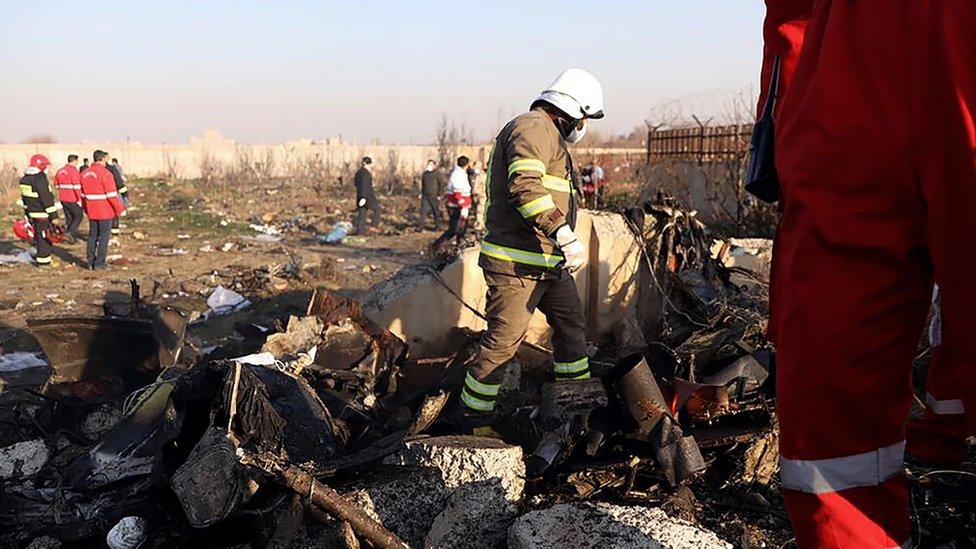
- Published11 January 2020
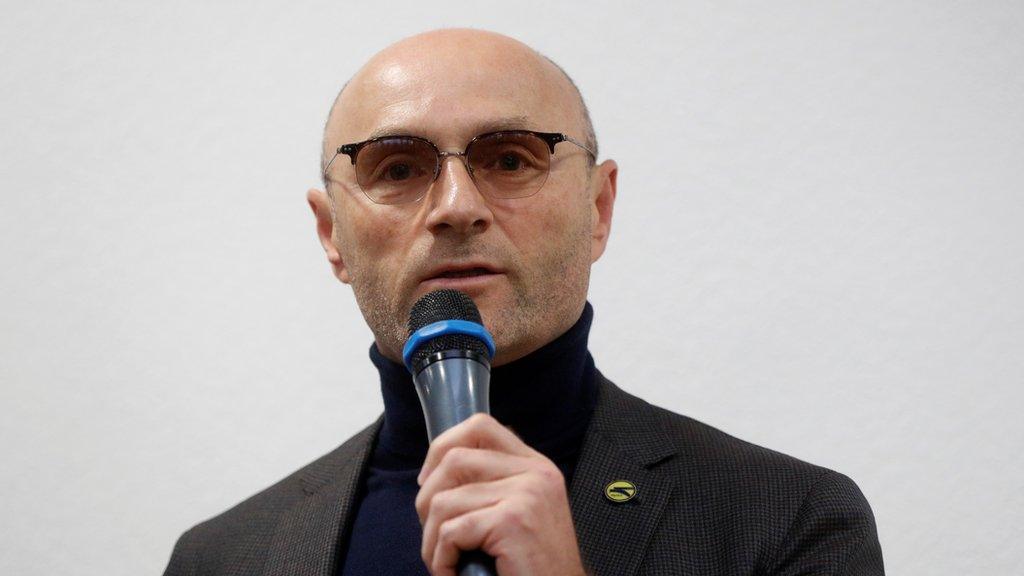
- Published9 January 2020
